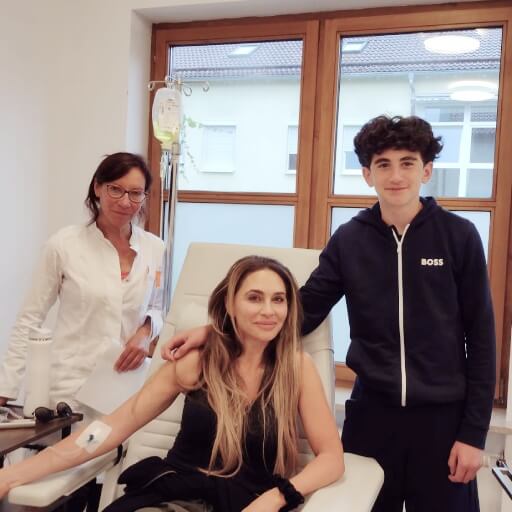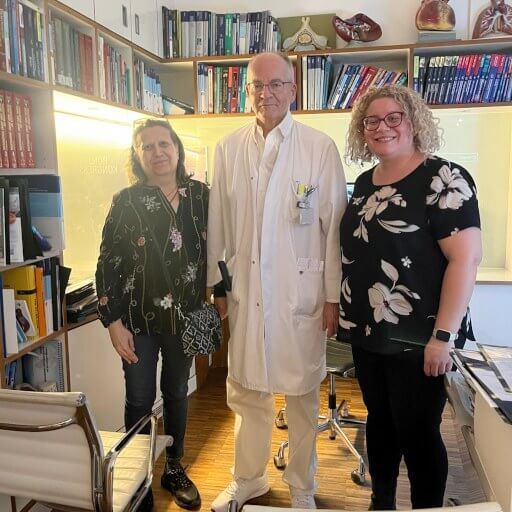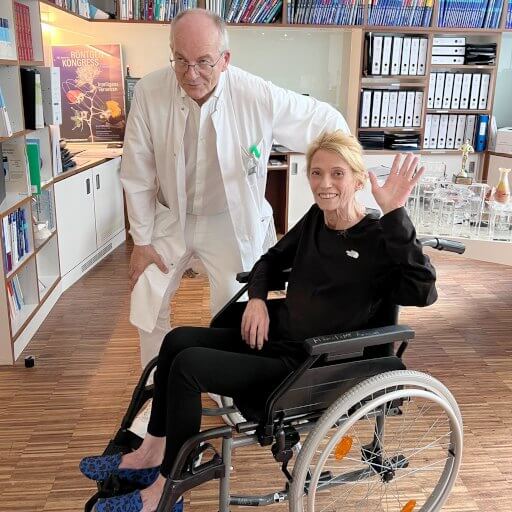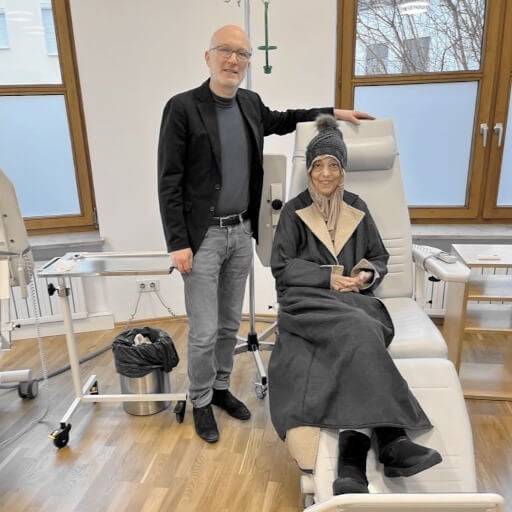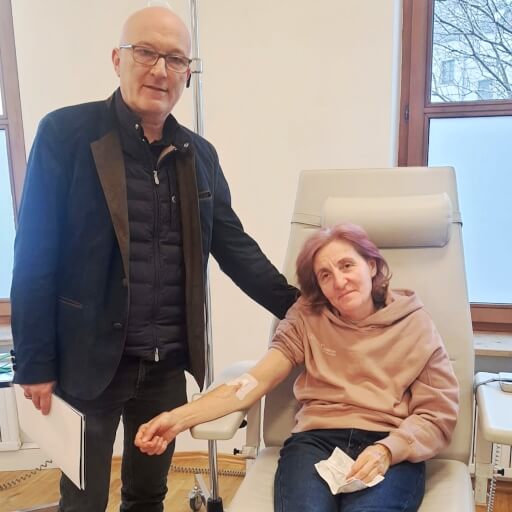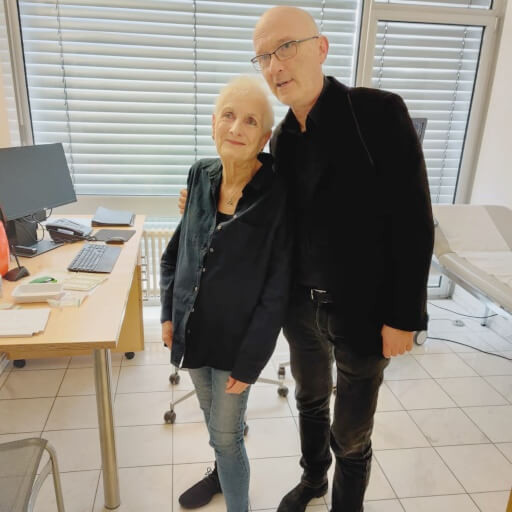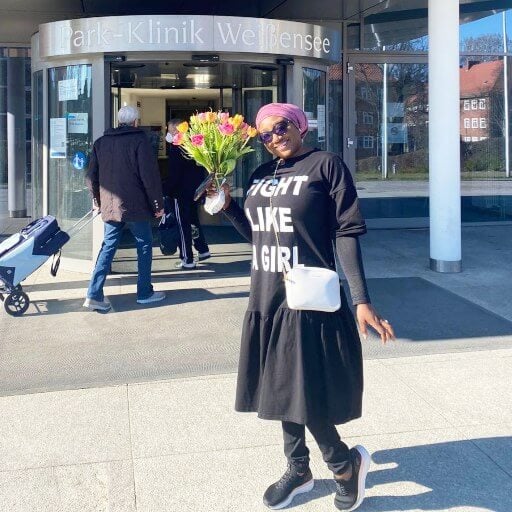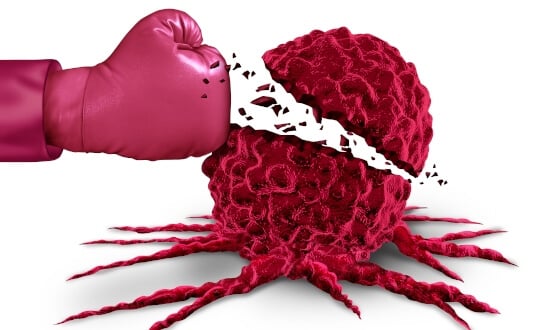Breast cancer (BCa) affects more than 2 million women each year, and approximately 10 percent of the cases are diagnosed with stage 4 and metastases [1]. German hospitals are the best providers of cancer treatment, as the most effective ones due to the combination of innovative technology with holistic treatment of the patient. The innovative options available to patients seeking breast cancer treatment are personalized dendritic cell vaccines with 90% response rates and regional chemotherapy. The techniques have demonstrated extraordinary effectiveness in the treatment of breast cancer stage 4 in Germany, and have thus provided patients with the newest medical advancements. Having almost 80 percent of all oncology work performed in Germany, patients with an advanced stage of breast cancer can be offered the innovative protocols, the globally recognized oncologists, and the most modern cancer facilities.
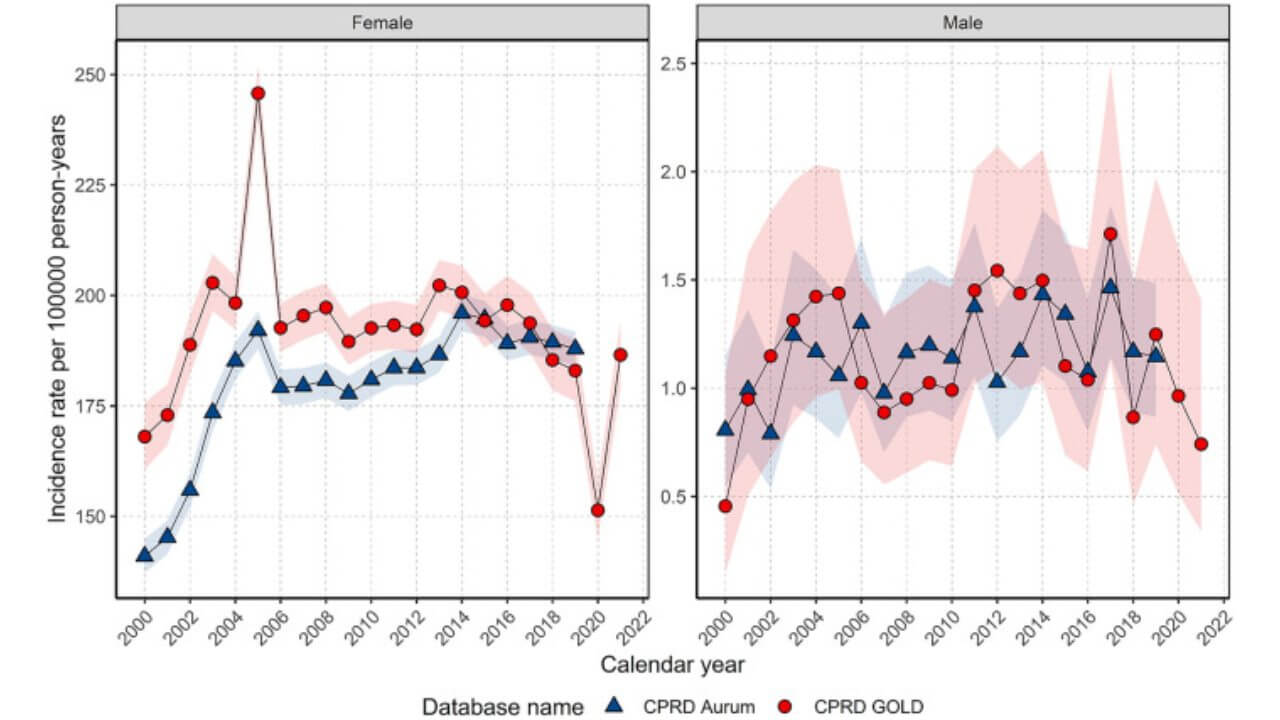
Why Standard Treatments for Stage 4 Breast Cancer May Not Be Enough
Stage 4 breast cancer is the most advanced type of the disease, in which the cancer cells break through the breast to other body parts and the lymph nodes. The size of the primary tumor is not of utmost importance at this stage, and secondary growth localizations are already present.
The conventional methods of treatment of breast cancer become limiting in these situations. Treatment using standard oncology models like chemotherapy usually has adverse side effects, organ damage, and impairment of the immune system, and a complete cure using conventional therapies alone is almost impossible.
The main problems are:
- It makes the disease very hard to manage, and full recovery using the conventional methods is virtually impossible
- The conventional chemotherapy is very toxic, with severe side effects and organ damage, and in some cases, fatal complications
- The immunosuppressive effects of the traditional chemotherapy are so violent that it not only targets cancer cells, but also severely suppresses the immune system, thus leaving the body unable to defend against the tumor naturally
German hospitals, on the other hand, are providing innovative breast cancer treatment, which has advanced techniques that have been developed to treat stage 4 breast cancer. They are personalized dendritic cell vaccines, targeted therapy, cryoablation, chemoembolization, and immunotherapy of breast cancer. These methods can lead to tremendous outcomes, reduce complications, extend life, and still maintain the quality of life of the patient.
The Very Latest and Most Effective Treatment Options for Stage 4 Breast Cancer
German hospitals are known throughout the world for innovative treatment plans and minimally invasive approaches. The treatment of cancer in Germany is at the cutting edge of medical science and has offered special treatment options in the case of metastatic breast cancer.
Dendritic cell vaccines and regional chemotherapy (TACE) are among the most promising methods of treating stage 4 cancer. They both have proven useful in the management of primary tumors, alleviating bone pain due to bone metastases, and the management of the metastatic disease. The future of therapy of breast cancer lies in these advanced methods, which enable patients to combat cancer more efficiently and with fewer side effects.
Stage 4 Breast Cancer Immunotherapy
Immunotherapy has been developed as a breakthrough treatment for breast cancer (BC), especially triple-negative breast cancer (TNBC), and HER2-positive variants (HER2+). The discovery of dendritic cells revolutionized the field, and Ralph Steinman won the Nobel Prize in 2011 on the grounds of his pioneering work on immunity in cancer research [3].
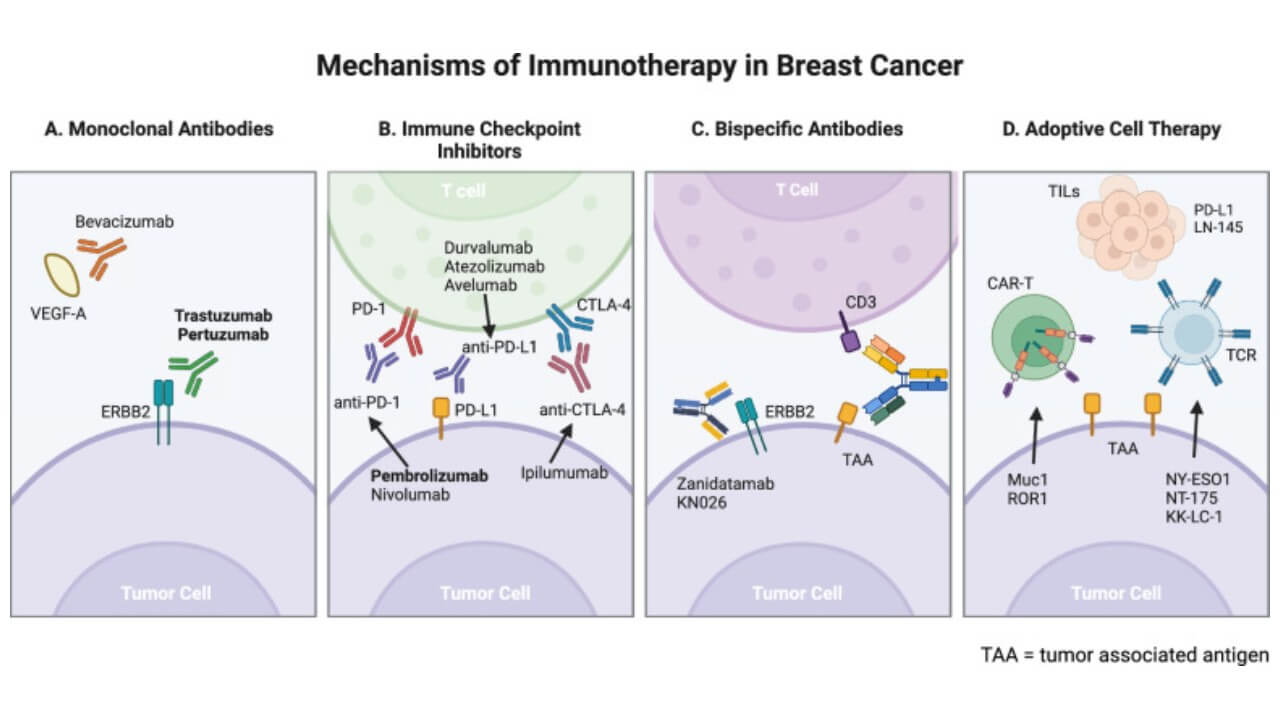
Existing treatment of breast cancer with immunotherapy involves:
- Dendritic cell vaccines (LANEX-DC) have a response rate exceeding 90 percent and excellent tolerability as they are personalized. One injection can induce prolonged anticancer immunity and enhance the body's defense system, and provide a powerful therapy. Dendritic cell vaccination is a safe treatment compared to conventional therapies, so it can be used together with other therapies to treat stage 4 cancer and remain effective.
- PD-L1 and PD-1 protein inhibitors are effective in triple-negative breast cancer. This treatment method of breast cancer may lead to a considerable decrease in the tumor size, and up to 10 percent of the patients experience a complete remission, and 10-20 percent present a stabilization of the disease.
- TIL protocol therapy, which involves the use of immune cells in the tumor tissue of a given patient that have been enhanced. They are described as cells that are highly aggressive against tumor antigens, and they are grown in the laboratory to multiply excessively, then again implanted back into the body of the patient.
- CAR T-cell therapy is a genetic engineering method that uses immune cells to attack cancerous cells. This method is innovative, but it is more costly and time-consuming than other forms of immunotherapy that involve short hospitalization.
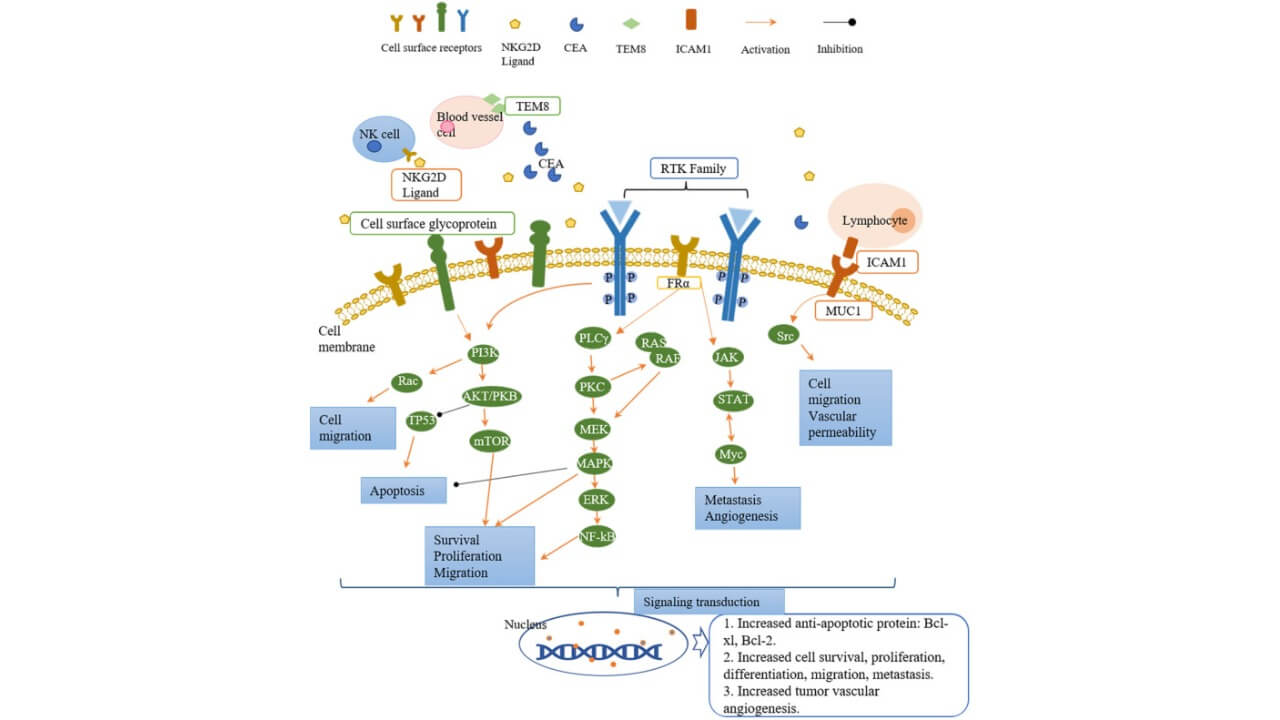
Dendritic cell therapy stands out as one of the most innovative breast cancer solutions. This approach creates personalized dendritic cell vaccines using the patient’s own immune cells, particularly effective for patients who have not responded to standard cancer treatment. The therapy has shown remarkable success in treatment in German hospitals, which combines advanced technologies with personalized protocols.
| Treatment | 2-Year Survival Rate* | Response Rate** | Cost of treatment, €*** |
|---|---|---|---|
| Dendritic cell therapy | up to 85% | up to 90% | 20,000 - 38,000 |
| Checkpoint inhibitors | up to 45% | up to 45% | 375,000 - 420,000 for the full course |
| CAR T-cell therapy | up to 50% | up to 40% | 450,000 - 550,000 |
*Booking Health data. Survival rates vary widely depending on the type of cancer, the patient's condition, and specific circumstances.
**Booking Health data. Response rate is the number of patients who show improvement after treatment.
***The cost of treatment depends on the type of tumor, stage of cancer, and other factors.
We interviewed the researcher of the dendritic cell therapy, Prof. Dr. Frank Gansauge, who is an expert in immunotherapy and the founder of LDG Laboratories. Prof. Gansauge has over 22 years of experience in dendritic cell therapy and beyond 2,500 successful procedures. He has built one of the most successful facilities in Europe for this innovative treatment. His clinic is known for LANEX-DC dendritic cell immunotherapy, which is especially effective in advanced-stage breast cancer. In the interview, he speaks of the science of dendritic cell therapy, its use in oncology, and the impressive results in the treatment of breast malignancies.
Prof. Frank Gansauge: How Dendritic Cell Therapy is Transforming Modern Cancer Treatment
Transarterial Chemoembolization (TACE) for Stage 4 Breast Cancer
Regional chemotherapy or chemoembolization for the treatment of fourth-stage breast cancer can be used for local control of the primary tumor and local or distant organ metastases. The procedure involves targeted delivery of chemotherapy drugs directly to the tumor site, followed by vessel embolization to maximize treatment effectiveness while minimizing systemic side effects. The administration of chemotherapy agents directly into the arteries feeding the tumor is more effective since it allows for creating high drug concentrations in the tumor tissues. The procedure avoids traumatic surgery and breast removal.
The tumor can have different sources of blood supply. Before the procedure, the doctor injects a contrast agent into the arteries and takes X-ray images to determine which vessels feed the tumor. He then injects emboli into these vessels: these can be mammary, internal thoracic, intercostal arteries, or branches of the subclavian artery. Such targeted embolization is called selective embolization. It leads to the partial death of the tumor, the healing of ulcerative defects, and pain relief, as early as 2-3 days after the procedure.
This minimally invasive treatment is particularly effective for:
- Primary tumor control through targeted chemotherapy delivery
- Liver metastasis occurring in 80% of metastatic breast cancers (MBC)
- Inoperable tumors and recurrences resistant to other treatments
- Cases with bleeding or skin ulceration
- Cases requiring palliative care
The duration of the complex treatment program is about 7 days, and it is outpatient, with costs ranging from 6,500 to 24,000 EUR, depending on the specific protocol requirements.
Prof. Kovács: Why Interventional Oncology Should Be the Fourth Pillar of Cancer Care
Regional Chemotherapy for Metastatic Breast Cancer
Regional chemotherapy in Germany delivers concentrated drugs directly into tumor-feeding arteries – bypassing the dilution that cripples conventional treatment. Standard IV chemotherapy disperses across 5-7 liters of blood before reaching cancer cells.
Arterial infusion changes everything: drug concentrations surge up to 80 times higher at tumor sites. German oncology centers have perfected catheter-guided delivery through sophisticated imaging and decades of clinical refinement. Breast tumors respond exceptionally well due to their rich vascular networks – a biological advantage that German specialists exploit ruthlessly.
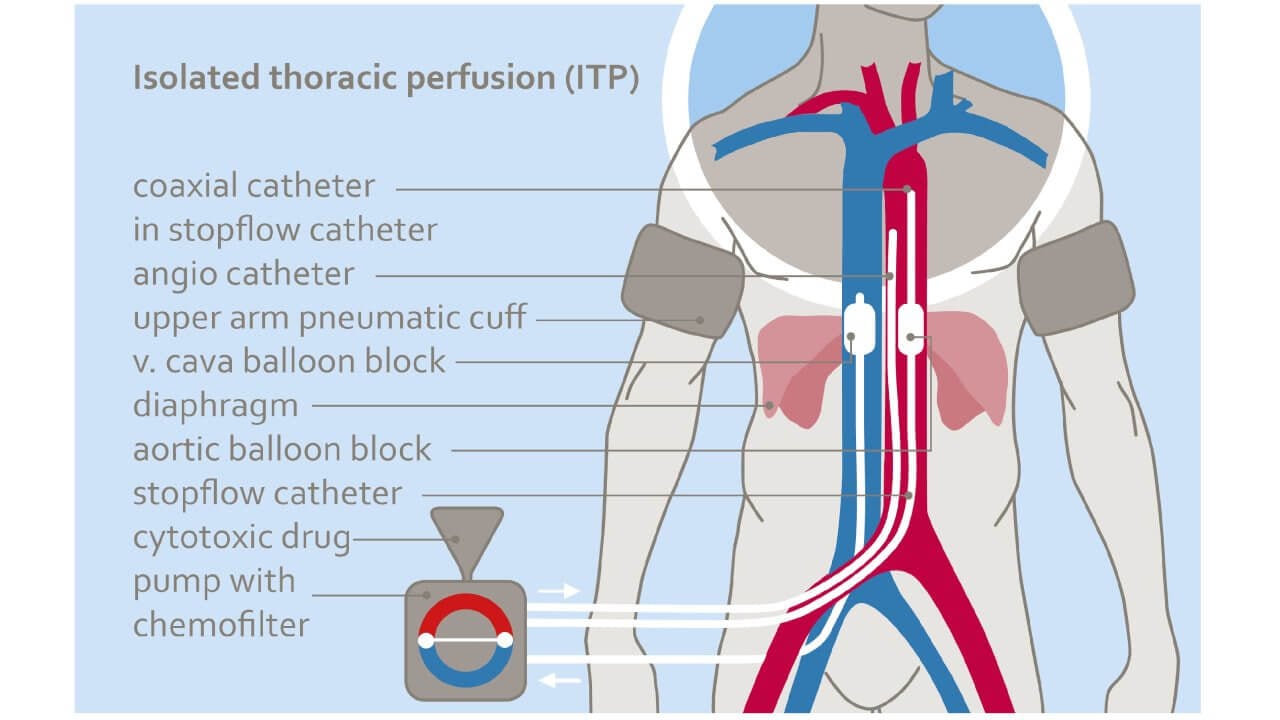
Regional chemotherapy for advanced breast cancer yields dramatic shrinkage in most patients. Large masses often reduce sufficiently for surgical removal after just one or two sessions.
The German approach includes blood filtration that removes residual drugs within 45 minutes. Side effects? Virtually nonexistent. Patients walk freely almost immediately – a stark contrast to traditional chemotherapy's aftermath. Precision targeting combined with toxicity elimination makes Germany the global leader in regional therapy.
Electrochemotherapy in Breast Cancer Stage 4
Electrochemotherapy treatment of breast cancer metastases and primary neoplasms harnesses controlled electrical pulses to revolutionize cellular drug delivery. The technique creates temporary nanopores in tumor membranes, allowing chemotherapy to penetrate 70-80% more effectively than standard methods.
German cancer centers have pioneered combining electro-chemotherapy with arterial infusion. Specialized needles position 2.5-3 centimeters apart around tumors while computer-controlled generators deliver precisely calibrated electrical fields. After electroporation opens cellular pathways, drug combinations flood directly into cancer cells at impossible concentrations.
Clinical outcomes validate this approach: locally relapsed unresectable breast cancer achieved progression-free intervals exceeding one year, in responsive patients [6]. The cost of electrochemotherapy reflects specialized equipment and multidisciplinary expertise, yet many patients find the electrochemotherapy cost a worthwhile investment.
German excellence extends beyond technical capability to integrated treatment protocols combining multiple modalities. Professor Karl Reinhard Aigner, pioneer of this technique with over 20,000 regional perfusion procedures, shares his insights in the following interview.
Hyperthermia for Stage 4 Breast Cancer
Hyperthermia therapy involves the use of precisely targeted heat to damage cancer cells and make them more vulnerable to standard oncology treatment. In the case of stage 4 cancer, this method is usually applied as part of a multimodal program, combined with chemotherapy or neoadjuvant chemotherapy (NAC), radiation therapy, or immunotherapy for breast cancer.
Hyperthermia increases circulation, drug delivery, and the response of the immune system of the body by the gentle increase in temperature in the tumor area. It is quite useful with patients who have metastatic breast cancer, which provides new treatment options for stage 4 cancer.
Although it is not a standalone option, hyperthermia as part of breast cancer treatment contributes to the process being more effective. It aids in holistic patient management as tolerance to other medical interventions is enhanced, bone pain is relieved, and the patients have the ability to continue living a better life as they undergo cancer treatment.
Success Stories of Patients Who Beat Stage 4 Breast Cancer
The case of Magdalena Ivanova illustrates the potential of new breast cancer care and new forms of treatment that were a possibility with cancer treatment in Germany. Following her initial fight and survival of breast cancer using traditional treatment in her native land, Bulgaria, Magdalena experienced a tragic stage 4 breast cancer development that had spread to her bones. After having gone through the extreme side effects of conventional chemotherapy during her initial treatment, she was eager to discover ways of getting treatments to manage stage 4 cancer that would not only be effective but also have a good quality of life.
After a radical mastectomy, several courses of chemotherapy and radiation therapy in Bulgaria, Magdalena received targeted therapy against bone metastases, which meant her visiting the hospital monthly over eight years. The side effects of these traditional oncology therapies caused her to seek new approaches to cancer treatment, which would provide new hope.
This search brought her to LDG Laboratories in Germany, where she found dendritic cell immunotherapy. The DC dendritic cell therapy procedure was very comfortable and without any side effects for Magdalena. The process entailed the production of a customized dendritic cell vaccine using her blood cells to enhance her immune system to combat cancer.
The dendritic cell therapy was not only very tolerable but also minimally invasive, unlike her earlier medical procedures. She had no limitations on daily activities, and she was able to continue living normally during the treatment in Germany. All this was under the supervision of qualified professionals who took overall care of the patient, gave her psychological support, and periodically checked her blood tests to monitor their progress.
Today, Magdalena's story is a testament to the effectiveness of innovative breast cancer solutions in leading cancer centers in Germany. Her experience highlights how combining traditional therapies with personalized immunotherapy for breast cancer, particularly dendritic cell-based methods, can offer hope to patients with advanced-stage breast cancer while preserving their quality of life.
Top Cancer Centers in Germany for Breast Cancer Treatment
It is no longer a secret that patients who undergo cancer treatment in Germany are sure to get high-quality and effective results. Treatment in German hospitals combines advanced technologies with internationally trained oncologists, ensuring that patients receive state-of-the-art oncology treatment. Modern medical equipment, doctors who constantly improve their qualifications, the introduction of the very latest achievements in cancer therapy, and top-class services – all of these factors make it possible to achieve the best outcomes in the treatment of cancer in Germany.
Leading Cancer Centers in Germany
- LDG Laboratories Dr. Gansauge. Well known in the early application of LANEX-DC dendritic cell immunotherapy, more than 2,500 successful procedures have been done here. Their tailored dendritic cell vaccines have proven to be especially useful with breast cancer at an advanced stage, with few side effects and outpatient therapies against stage 4 cancer. This is an especially useful DC dendritic cell therapy that is particularly helpful in patients who do not respond well to conventional treatment of cancer.
- Asklepios Hospital Barmbek Hamburg. A University of Hamburg academic hospital with up-to-date infrastructure and new methods of breast cancer treatment. The facility employs the use of the da Vinci surgical system and serves more than 110,000 patients per year. It has the certification of DIN EN ISO 9001:2015 and the German Cancer Society (DKG), with the top three medical tourism rankings in Germany.
- Frankfurt am Main Clinic of Advanced Biological Medicine. Having a history of 40 years, this facility is a pioneer in the field of an integrative approach to breast cancer treatment, which involves a combination of conventional treatment of cancer and a sophisticated biological treatment. They are not only interested in the treatment of cancer, but also the quality of life in general, with the help of specific biological therapy and individual treatment regimen according to the comprehensive diagnostics.
- Hyperthermia Center Hannover. Specialty is hyperthermia to treat stage 4 breast cancer and other novel treatments of breast cancer, which include six forms of hyperthermia, such as whole body and local. The center integrates conventional therapies with holistic medicine, with advanced treatment including albumin carrier therapy and photodynamic therapy. Their combination approach involves both in-hospital and out-of-hospital comprehensive care plans and excellent psychological support for patients.
Fighting breast cancer together, these institutions highlight how cancer centers in Germany provide advanced treatments, transforming modern cancer treatment and giving patients worldwide access to comprehensive patient care and the highest-quality oncology services.
A Medical Journey: Every Step of the Way With Booking Health
Finding the best treatment strategy for your clinical situation is a challenging task. Being already exhausted from multiple treatment sessions, having consulted numerous specialists, and having tried various therapeutic interventions, you may be lost in all the information given by the doctors. In such a situation, it is easy to choose a first-hand option or to follow standardized therapeutic protocols with a long list of adverse effects instead of selecting highly specialized innovative treatment options.
To make an informed choice and get a personalized cancer management plan, which will be tailored to your specific clinical situation, consult medical experts at Booking Health. Being at the forefront of offering the latest medical innovations for already 12 years, Booking Health possesses solid expertise in creating complex management programs in each individual case. As a reputable company, Booking Health offers personalized treatment plans for breast cancer with direct clinic booking and full support at every stage, from organizational processes to assistance during treatment. We provide:
- Assessment and analysis of medical reports
- Development of the medical care program
- Selection of a suitable treatment location
- Preparation of medical documents and forwarding to a suitable clinic
- Preparatory consultations with clinicians for the development of medical care programs
- Expert advice during the hospital stay
- Follow-up care after the patient returns to their native country after completing the medical care program
- Taking care of formalities as part of the preparation for the medical care program
- Coordination and organization of the patient's stay in a foreign country
- Assistance with visas and tickets
- A personal coordinator and interpreter with 24/7 support
- Transparent budgeting with no hidden costs
Health is an invaluable aspect of our lives. Delegating management of something so fragile yet precious should be done only to experts with proven experience and a reputation. Booking Health is a trustworthy partner who assists you in pursuing stronger health and a better quality of life. Contact our medical consultant to learn more about the possibilities of personalized treatment with innovative methods for breast cancer with leading specialists in this field.
Fighting Breast Cancer Together: Treatment Journeys with Booking Health
FAQ: Treatment of Stage 4 Breast Cancer in Germany
Send request for treatmentThese treatment options encompass chemotherapy, targeted therapy, immunotherapy, hormone therapy, and palliative care. German clinics can also provide the latest treatments, such as PARP inhibitors and clinical trials of new treatments.
The advantages are the ability to access the latest treatment methods, qualified specialists, and the opportunity to utilize a personalized care program based on the needs of a specific patient. German clinics frequently provide new therapies and clinical trials that are not common elsewhere.
Monitoring of effectiveness is in the form of frequent imaging tests, blood tests, and clinical examinations. Such tests aid physicians in identifying the effectiveness of the treatment and allow them to make appropriate corrections.
Side effects like nausea, fatigue and increased vulnerability to infections are some of the risks which are dependent on the specific treatment. These risks are controlled by close monitoring and supportive care.
Though stage 4 breast cancer cannot be cured, there are advanced treatments in Germany that can be used to manage the disease, extend life, and enhance the quality of life. The aim of treatment is to manage the cancer and relieve the symptoms.
Stage 4 breast cancer diagnosis is one where the cancer has now broken out of the breast and the lymph nodes that are nearby into other distant body organs like bones, liver, lungs, or even the brain. The symptoms of metastatic breast cancer are pain in the bones, persistent cough, weight loss, or neurological problems. Diagnosis is achieved through imaging (CT, MRI, PET), biopsy, and tumor markers evaluation.
German treatment of stage 4 breast cancer involves a combination of metastatic breast cancer (MBC) therapy, including chemotherapy, targeted therapy, hormone therapy, breast cancer immunotherapy, and local treatment, including cryoablation and chemoembolization. Dendritic cell vaccines are also provided in the top oncology centers as part of the individualized treatment.
Not generally, but it may be managed. New therapies have greatly improved the prognosis of metastatic BC, and many patients can experience long-term remission.
Germany has been able to increase the survival rate of stage 4 breast cancer patients because of new treatment methods and the early detection of metastasis. The average survival is several years, although there are patients who survive longer, depending on the response to treatment and the subtype of the cancer. On the whole, the survival of breast cancer at stage 4 is dependent on personal factors and the availability of modern treatment.
In Germany, breast cancer immunotherapy is conducted through dendritic cell therapy for breast cancer. It entails removing the dendritic cells of a patient and priming them in a lab with tumor antigens and re-injecting them to cause a targeted immune response against cancer cells. This is a highly tolerated therapy and can be found in superior German clinics.
Germany can be regarded as a leading option in terms of breast cancer treatment in stage 4, because of the high technologies, individual attention, and the availability of new treatments such as immunotherapy and dendritic cell vaccines. Germany has a reputation for quality, good outcomes, and quick access to oncology without a long wait list.
The cost of treating breast cancer in Germany at stage 4 of the disease ranges between €20,000 to €100,000 according to the therapies administered. As an example, dendritic cell therapy can be as expensive as €20,000-38,000, and up to €25,000 for the cryoablation. Germany has fixed cost packages and transparent pricing, unlike the cancer therapy prices in Europe.
Yes, the integrative oncology in Germany gives patients the option of integrating conventional treatment with complementary cancer therapy like acupuncture, nutrition support, mind-body therapies, and herbal medicine. These special precautions will alleviate side effects and enhance wellness during treatment.
Advanced breast cancer may reveal itself with bone pain, unexplained weight loss and other non-specific symptoms. Metastases – depending on their location and number – may cause other symptoms.
With dendritic cell therapy 2-year survival is up to 85%, with checkpoint inhibitors – up to 45%, and with CAR T-cell therapy – up to 50%. These are general % that depend heavily on the clinical situation.
Beyond all doubt, different treatment methods will have not the same efficacy in different women. If we take general numbers, dendritic cell therapy demonstrates up to 90% response rates, checkpoint inhibitors achieve up to 45%, while CAR T-cell therapy reaches up to 40%.
Dendritic cell therapy here costs €20,000-38,000, checkpoint inhibitors – €375,000-420,000 (for the full course), and CAR T-cell therapy – €450,000-550,000. TACE costs €6,500-24,000 depending on protocol requirements. You can find other prices on the Booking Health website.
Stage 4 breast cancer treatment focuses on disease control. Along with systemic therapy, innovative approaches (such as immunotherapy, transarterial chemoembolization and hyperthermia) demonstrate excellent results.
The best hospitals for stage 4 breast cancer treatment in Germany are comprehensive cancer centers – they combine advanced treatments within multidisciplinary teams.
Choose treatment abroad and you will get the best results surely!
Authors:
This article was edited by medical experts, board-certified doctors Dr. Nadezhda Ivanisova, and Dr. Bohdan Mykhalniuk. For the treatment of the conditions referred to in the article, you must consult a doctor; the information in the article is not intended for self-medication!
Our editorial policy, which details our commitment to accuracy and transparency, is available here. Click this link to review our policies.
Source:
[1] Sergiusz Łukasiewicz, Marcin Czeczelewski, Alicja Forma et al. Breast Cancer—Epidemiology, Risk Factors, Classification, Prognostic Markers, and Current Treatment Strategies—An Updated Review. Cancers (Basel). 2021 Aug 25;13(17):4287. doi: 10.3390/cancers13174287. [DOI] [PMC free article]
[2] Nicola L Barclay, Edward Burn, Antonella Delmestri et al. Trends in incidence, prevalence, and survival of breast cancer in the United Kingdom from 2000 to 2021. Sci Rep. 2024 Aug 17;14:19069. doi: 10.1038/s41598-024-69006-1. [DOI] [PMC free article]
[3] Nobel Prize. The Nobel Prize in Physiology or Medicine 2011 – Ralph Steinman. https://www.nobelprize.org/prizes/medicine/2011/steinman/facts/
[4] Natalie K. Heater, Surbhi Warrior & Janice Lu. Journal of Hematology & Oncology volume 17, Article number: 131 (2024). Current and future immunotherapy for breast cancer. https://jhoonline.biomedcentral.com/articles/10.1186/s13045-024-01649-z
[5] Yu-Huan Yang, Jia-Wei Liu, Chen Lu, Ji-Fu Wei. CAR-T Cell Therapy for Breast Cancer: From Basic Research to Clinical Application. Int J Biol Sci. 2022 Mar 21;18(6):2609–2626. doi: 10.7150/ijbs.70120. [DOI] [PMC free article]
[6] Aigner K, Selak E, Pizon M, et al. Arterial infusion and isolated perfusion in combination with reversible electroporation for locally relapsed unresectable breast cancer. Cancers (Basel). 2024;16(23):3991. doi:10.3390/cancers16233991. [DOI]
Read:
Breast cancer treatment with dendritic cells in Germany
Comprehensive Guide to Stage 4 Breast Cancer: Treatment Options
Breast Cancer Treatment in Germany: Innovative Therapies and Top Clinics
Article menu:
- Why Standard Treatments for Stage 4 Breast Cancer May Not Be Enough
- The Very Latest and Most Effective Treatment Options for Stage 4 Breast Cancer
- Success Stories of Patients Who Beat Stage 4 Breast Cancer
- Top Cancer Centers in Germany for Breast Cancer Treatment
- A Medical Journey: Every Step of the Way With Booking Health
- FAQ: Treatment of Stage 4 Breast Cancer in Germany
Don't know where to start?
Contact Booking Health
